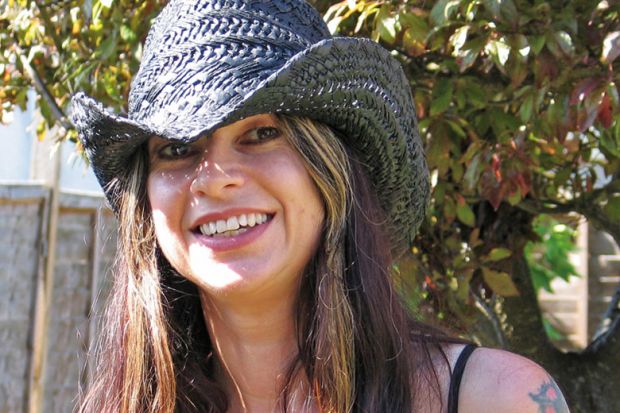Tanya Krzywinska is professor of digital games at Falmouth University. She started playing computer-based games on Usenet when working at the Digital Equipment Corporation during her MA. After completing her PhD she discovered that there was little academic writing about video games and decided to correct this. She was president of the Digital Games Research Association from 2006 to 2009 and is editor-in-chief of the Games and Culture journal. She was selected as one of the Top 100 Women in Games 2015 in MCV, the computer and video games trade magazine.
Where and when were you born?
UK, South Coast, sometime last century.
How has this shaped you?
A time and place where creative expression was discouraged and there seemed few career options bar secretarial work, catering or nursing. I was looking for something else, although at least I learned to touch-type.
Video games research sounds like a lot of fun. Is that the perception of it?
OK, it’s all fun and games, every day. We never have to deal with analytics, metrics or financial management, nor write funding bids, or have to deal with conceptual and technical complexity.
Is there still a mentality in the academy that video games research is not a credible field?
Maybe 10 years ago, but now the economic and cultural power of games has been generally recognised. Testimony to such recognition is the number of courses in higher education and further education that have recently started and the involvement of games in activities outside entertainment, so-called gamification. Of course, some people question games.
‘Gamergate’ threw into relief the sexism that exists within video games. Is that something you’re particularly aware of? And why are women in games still subjected to abuse?
It’s impossible to be a woman in games and not be aware of the gender politics in play, but perhaps the backlash is a sign that things are changing.
What is the significance of being included in the Top 100 Women in Games list?
It is great for academics to be included in the list, which is primarily made up of people from the games industry. The list is important because it provides a chance to promote women in the industry and to show that they are involved in every aspect of games development, from research to design. It helps create a sense of community and potentially raise the aspirations of younger women who are intrigued by the possibilities of games.
There are only six academics on the list. Does the gaming industry embrace academics who do research on their world?
Because of the more vocational orientation of higher education there is an increasingly strong synergy between industry and academia. For some in the industry it can be hard to understand the broader context of higher education and some of the types of research we do. I believe it is important for higher education to provide skills and knowledge that look towards the long term.
Do you know of a game where academics play the central role?
I am sure there is a game where Umberto Eco is the main character; if not then there should be!
If you were a prospective student facing £9,000 fees, would you go or get a job?
I’d definitely go to university. How else would you meet like-minded people to work with to set up a games development company? A good games education builds skills and permits experimentation so that you can get a better grasp of what’s required to operate independently and, as far as possible, determine your own fate.
What advice would you give to your younger self?
Make more art.
What are the best and worst things about your job?
The best? Playing with ideas. The worst? Not having enough time to play with ideas.
If you weren’t an academic, what do you think you’d be doing?
I’d be an artist.
What advice do you give to your students?
Approach everything critically and creatively. Be open to learning and change.
What keeps you awake at night?
Prosaically, things that I had forgotten to do that day. More generally, the extreme folly of humankind.
What’s your biggest regret?
Hard to answer that honestly without a therapist present.
What kind of undergraduate were you?
Pretty diligent, hungry for knowledge. I didn’t go to university until I was 23, so I had a strong desire to learn and it was a great opportunity to watch obscure films and read fiction and critical theory.
What’s your most memorable moment at university?
As a student, probably sitting for days in dusty examination rooms, writing about Nietzsche and Thomas Mann. As an employee, the moment I hooked up with [UK games designer] Steve Jackson, which lead to the creation of an MA in Games Theory and Design.
Tell us someone you admire.
Leonora Carrington [surrealist painter and novelist] for her uncompromising, surreal and oracular artistic vision.
What is the biggest misconception about your field of study?
That making games is easy.
What would improve your working week?
More exercise. Definitely.
If you were higher education minister for a day, what policy would you introduce?
Abolition of tuition fees.
What is the greatest video game ever made?
I’m not sure it is the greatest, but Silent Hill is certainly the one that I feel showed the capacity for games for making fiction. The whole Warcraft franchise has to be celebrated for its popularity and longevity. The Secret World worked hard to break the fourth wall in some really interesting ways.
Microsoft Xbox or Sony PlayStation?
Neither. PC gamer all the way!
Appointments
Michel Hockx has been appointed director of the University of Notre Dame’s Liu Institute for Asia and Asian Studies in the new Keough School of Global Affairs. Professor Hockx is currently professor of Chinese and director of the China Institute at Soas, University of London. He will join the Notre Dame faculty in August 2016. As director of one of the seven academic units now part of Keough, he will contribute to the ongoing formation of the school, which opens its doors to students in August 2017. “His appointment will be a catalyst across the university for deepening understanding of, and engagement with, the whole Asian continent, and for raising Notre Dame’s profile in Europe, Asia and beyond,” said Scott Appleby, Marilyn Keough dean of the school.
Kate Rigby has been appointed professor of environmental humanities at Bath Spa University. Professor Rigby joins from Monash University, where she held the same position. In her new role, she will be responsible for shaping the research strategy for the field – an emerging area of interdisciplinary research examining the relationship between human culture and the physical environment by bringing arts and humanities and geographical fields together with the natural sciences. Professor Rigby said: “Australia has been at the forefront of the development of the environmental humanities…I’m looking forward to bringing that understanding with me to Europe, while learning more myself about ‘old world’ cultural ecologies.”
Mike Hulme has been appointed the new head of geography at King’s College London. Professor Hulme took up his position at the beginning of April.
The University of Exeter has appointed Lord Myners as its new chancellor.
Jayne Billam has joined Nottingham Trent University as its new human resources director.
Achim Steiner has been appointed the next director of the Oxford Martin School at the University of Oxford, joining from the United Nations Environment Programme.
POSTSCRIPT:
Print headline: HE & me
Register to continue
Why register?
- Registration is free and only takes a moment
- Once registered, you can read 3 articles a month
- Sign up for our newsletter
Subscribe
Or subscribe for unlimited access to:
- Unlimited access to news, views, insights & reviews
- Digital editions
- Digital access to THE’s university and college rankings analysis
Already registered or a current subscriber?




